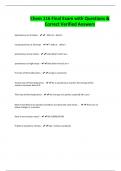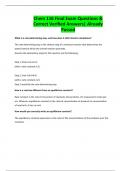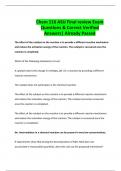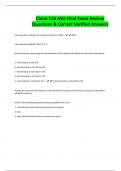Chem 116 final exam - Study guides, Class notes & Summaries
Looking for the best study guides, study notes and summaries about Chem 116 final exam? On this page you'll find 36 study documents about Chem 116 final exam.
All 36 results
Sort by
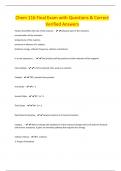 Popular
Popular
-
Chem 116 Final Exam with Questions & Correct Verified Answers
- Exam (elaborations) • 7 pages • 2024
-
- $11.99
- 1x sold
- + learn more
Factors that Affect the rate of the reaction: - physical state of the reactants. concentration of the reactants. temperature of the reaction. presence or absence of a catalyst. (Collision energy, collision frequency, collision orientation) In a rate expression... - the products will be positive and the reactants will be negative Intermediate - is first produced, then used as a reactant Catalyst - CRP, reactant than product
ASU CHEM 116 Final Exam Review 2022-2023 latest exam questions and answers
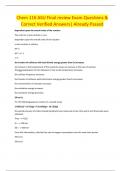 Popular
Popular
-
Chem 116 ASU Final review Exam Questions & Correct Verified Answers| Already Passed
- Exam (elaborations) • 20 pages • 2024 Popular
-
- $12.99
- 1x sold
- + learn more
dependent upon the overall order of the reaction The units for a rate constant, k, are: dependent upon the overall order of the reaction a rate constant is unitless M^-1 M^-1 s^-1 s^-1 the fraction of collisions with total kinetic energy greater than Ea increases. An increase in the temperature of the reactants causes an increase in the rate of reaction. The best explanation for this behavior is that as the temperature increases, the collision frequency increases. the fraction of coll...
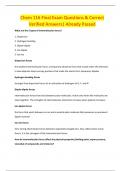
-
Chem 116 Final Exam Questions & Correct Verified Answers| Already Passed
- Exam (elaborations) • 14 pages • 2024
-
- $12.99
- + learn more
What are the 5 types of intermolecular forces? 1. Dispersion 2. Hydrogen bonding 3. Dipole-dipole 4. Ion-dipole 5. Ion-Ion Dispersion forces the weakest intermolecular force; a temporary attractive force that results when the electrons in two adjacent atoms occupy positions that make the atoms form temporary dipoles Hydrogen bonding forces stronger than dispersion forces its an attraction of hydrogen to O, F, and N Dipole-dipole forces intermolecular forces that exist between polar m...
Chem 116 Final Exam with Questions & Correct Verified Answers
Chem 116 Final Exam Questions & Correct Verified Answers| Already Passed
Chem 116 ASU Final review Exam Questions & Correct Verified Answers| Already Passed

-
Chem 116 ASU Final Exam Review Questions & Correct Verified Answers
- Exam (elaborations) • 10 pages • 2024
-
- $12.24
- + learn more
A catalyst accelerates a reaction because: A.) it decreases the number of molecules with energy equal or greater than the activation energy B.) it lowers the activation energy for the reaction C.) it increases the number or collisions between molecules D.) it supplies energy to reactant Molecules. - B.) it lowers the activation energy for the reaction Consider the Reaction: 8A(g) + 5B(g) --> 8C(g) + 6D (g)
Chem 116 ASU Final Exam Review Questions & Correct Verified Answers
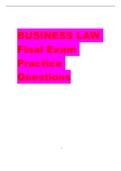
-
BUSINESS LAW Final Exam Practice Questions (1)
- Exam (elaborations) • 40 pages • 2022
-
- $10.49
- 1x sold
- + learn more
1 BUSINESS LAW Final Exam Practice Questions 2 BUSINESS LAW – Bus 340 PRACTICE QUESTIONS The following practice questions, both the question type and content, are similar to the type and format of questions on the final exam. Please use them a study aid to prepare for the final exam. 1. In a civil lawsuit against Ellen, Fred obtains an injunction, which is: a. a remedy at law. b. an equitable remedy. c. not possible under our U.S. system of jurisprudence. d. none of the above...

How did he do that? By selling his study resources on Stuvia. Try it yourself! Discover all about earning on Stuvia


